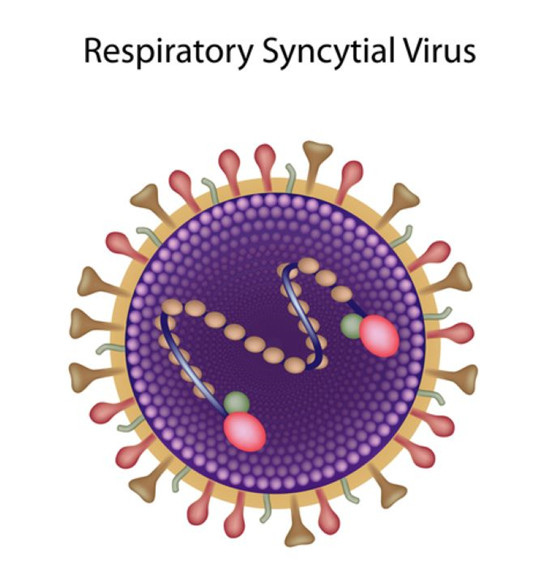Recently, according to information from the National Children's Hospital, the number of young children, especially those with underlying medical conditions with respiratory syncytial virus (RSV), has been increasing. An estimated 60% of children are infected before age 1, and up to 80% of children are infected with RSV by age 2.
What is respiratory syncytial virus (RSV)?
Respiratory syncytial virus (RSV) is a virus with single-stranded RNA, this is a form of virus that when attacked into the body, will cause infections in the lungs as well as in the respiratory tract, which can lead to pneumonia, bronchitis,... The winter-spring, spring-summer climate is ideal conditions for them to thrive.
For children, most contract the virus before the age of two. They can also cause illness in adults and usually 2 to 8 days after infection with the virus symptoms appear.

Like many viruses that infect respiratory organs, RSV enters the body through the mouth, nose or eyes. They can also survive outside the environment for hours, on objects or tools. Because of this, their spread from person to person can be through many ways: sneezing, coughing, touching secretions from a sick person or objects contaminated with this secretion, even shaking hands, and then putting them on the eyes, nose, mouth.
Symptoms of acute lower respiratory tract inflammation caused by RSV
Children infected with respiratory syncytial virus usually incubate for 4-6 days after which they will show symptoms:
The most recognizable clinical manifestations are bronchiolitis and pneumonia.
The first days of symptoms of upper respiratory tract inflammation: Low-grade fever, high fever or no fever; nasal congestion, clear runny nose, adhesive glue; sneezing, sore throat; intense dry cough after cough white sputum turns yellow, vomiting when coughing.
Rapid progression may include shortness of breath, tachypnea, cyanosis, skipping feeding, seizures, etc. or lungs with snakes. Apnea is a sign that can happen to babies younger than 6 months. Healthy children may exhibit symptoms that are usually mild, not obvious.
Dangerous complications
RSV infection can cause many dangerous complications.
- Pneumonia: RSV is the most common cause of pneumonia or bronchiolitis in children. These complications occur when the virus attacks the lower respiratory tract, especially for those at risk such as infants, young children, immunocompromised children or chronic diseases, the pneumonia is getting worse.
- Otitis media: A common complication in infants and young children.
- Bronchial asthma: Many studies have shown that young children with severe respiratory syncytial virus infection are at risk of causing prolonged wheezing in children and developing asthma as adults.
- Some other serious and dangerous complications such as respiratory failure, collapsed lungs, pneumothorax, pulmonary gas stasis...
Don't worry because there is Halixol – cough syrup made in Hungary contains active ingredient Ambroxol that is effective in treating acute and chronic obstructive respiratory diseases such as bronchial asthma and bronchitis, bronchiectasis due to excessive production of mucus and phlegm to help relieve cough, expectorant for clear and healthy breath.
Source: Hanoi Department of Health

See more product information here.